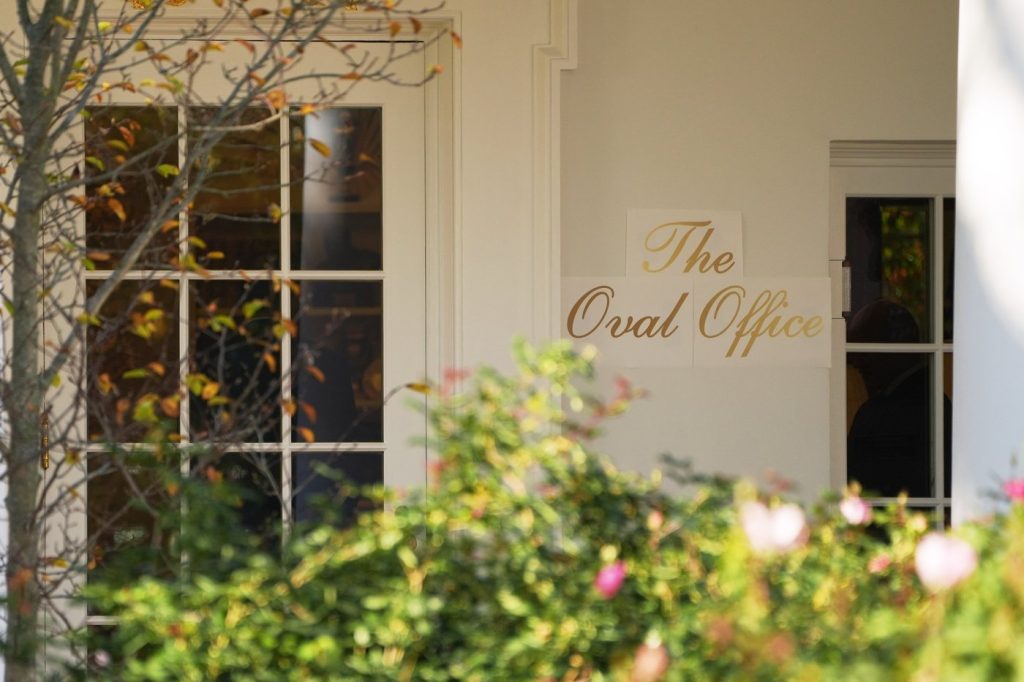Politics
GOP Leaders Defend Trump’s Leadership After Election Losses

Republican leaders are rallying behind former President Donald Trump following significant election defeats in Georgia, New Jersey, Pennsylvania, and Virginia on November 4, 2023. Despite the losses, many within the party insist that there is no fundamental issue with Trump’s leadership or the Republican Party’s policies. Instead, they attribute the setbacks to external factors, including what they describe as misleading narratives from Democrats and the media regarding economic conditions.
In the aftermath of the elections, party officials are urging candidates to align closely with Trump and to highlight his achievements. During a series of discussions involving key Republican figures in Washington, including those in the White House, the consensus emerged that Trump’s leadership remains essential to the party’s identity and future strategies. Republican National Committee spokesperson Kiersten Pels emphasized, “Republicans are entering next year more unified behind President Trump than ever before,” asserting that the party’s alignment with his America First agenda is crucial for electoral success.
Despite a growing number of voters expressing concerns about affordability and economic stability, Trump continues to assert that the economy is thriving, suggesting that reports of hardship are exaggerated. He has recently shifted his messaging to focus on affordability, claiming that consumer prices are lower than reported. On social media, Trump stated, “Affordability is a lie when used by the Dems. It is a complete CON JOB,” while also inaccurately asserting that Thanksgiving costs are 25% lower than the previous year.
Voter sentiment, however, reveals a different perspective. The AP Voter Poll highlighted economic worries as the primary concern influencing voters in the recent elections. Republican strategist Doug Heye noted that Trump’s approach might not resonate with candidates who need to connect with constituents facing economic challenges. “Republicans need to relay to voters that they understand what they’re going through and that they’re trying to fix it,” Heye explained. He cautioned that if candidates do not address the issues that voters care about, they risk losing their attention.
Mixed Reactions from GOP Candidates
Not all Republican candidates share Trump’s optimistic view of the economic landscape. Elise Stefanik, a Republican representative from New York who is campaigning for governor, underscored affordability as the top issue for her constituents. She stressed the importance of focusing on practical concerns, such as high taxes and living costs, rather than solely on cultural issues that have dominated recent Republican messaging.
Stefanik articulated a nuanced stance regarding Trump’s influence on the party. While she refrained from criticizing his major policies, she suggested that the party’s unity behind him may not be as absolute as some leaders claim. “My sense is our party is fully united behind firing Kathy Hochul,” she remarked, referring to New York’s Democratic governor, indicating that her focus remains on local issues rather than national party dynamics.
The Republican National Committee (RNC) has released talking points that dismiss the recent electoral setbacks as a result of Democratic advantages in key states. These communications attempt to downplay the implications of the losses, asserting that they do not reflect a broader discontent with Trump’s leadership or the MAGA agenda. However, these assertions contrast with polling data that shows Trump’s approval rating at 36%, which is slightly improved from the previous term but still lower than the ratings of former Presidents Barack Obama and George W. Bush at similar points in their presidencies.
Navigating Future Elections
As the Republican Party prepares for the critical midterm elections in 2026, the challenge lies in balancing loyalty to Trump with the need to address pressing voter concerns. Historical trends indicate that the party holding the presidency often experiences significant losses in non-presidential elections, adding pressure to Republican candidates aiming to maintain or regain control of Congress.
The RNC’s messaging strategy aims to mobilize Trump supporters to the polls in 2026, stating, “To win in 2026, Make America Great Again voters will need to show up at the ballot box; President Trump and Republicans are going to make that happen.” This determination reflects a commitment to reinforcing Trump’s influence within the party, even as concerns about the economic realities faced by voters grow louder.
As Republican leaders navigate their path forward, the dynamic between Trump’s vision and the electorate’s needs will be pivotal in shaping the party’s strategies and chances at the ballot box in the years ahead.
-

 Politics1 week ago
Politics1 week agoSecwepemc First Nation Seeks Aboriginal Title Over Kamloops Area
-

 World4 months ago
World4 months agoScientists Unearth Ancient Antarctic Ice to Unlock Climate Secrets
-

 Entertainment4 months ago
Entertainment4 months agoTrump and McCormick to Announce $70 Billion Energy Investments
-

 Lifestyle4 months ago
Lifestyle4 months agoTransLink Launches Food Truck Program to Boost Revenue in Vancouver
-

 Science4 months ago
Science4 months agoFour Astronauts Return to Earth After International Space Station Mission
-

 Technology3 months ago
Technology3 months agoApple Notes Enhances Functionality with Markdown Support in macOS 26
-

 Top Stories1 month ago
Top Stories1 month agoUrgent Update: Fatal Crash on Highway 99 Claims Life of Pitt Meadows Man
-

 Sports4 months ago
Sports4 months agoSearch Underway for Missing Hunter Amid Hokkaido Bear Emergency
-

 Politics3 months ago
Politics3 months agoUkrainian Tennis Star Elina Svitolina Faces Death Threats Online
-

 Politics4 months ago
Politics4 months agoCarney Engages First Nations Leaders at Development Law Summit
-

 Technology4 months ago
Technology4 months agoFrosthaven Launches Early Access on July 31, 2025
-

 Top Stories3 weeks ago
Top Stories3 weeks agoFamily Remembers Beverley Rowbotham 25 Years After Murder





















